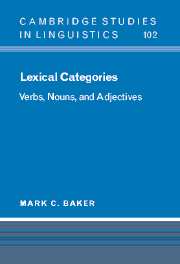
-
Select format
-
- Publisher:
- Cambridge University Press
- Publication date:
- 06 January 2010
- 13 March 2003
- ISBN:
- 9780511615047
- 9780521001106
- Dimensions:
- Weight & Pages:
- Dimensions:
- (228 x 152 mm)
- Weight & Pages:
- 0.62kg, 372 Pages
You may already have access via personal or institutional login
Book description
For decades, generative linguistics has said little about the differences between verbs, nouns, and adjectives. This book seeks to fill this theoretical gap by presenting simple and substantive syntactic definitions of these three lexical categories. Mark C. Baker claims that the various superficial differences found in particular languages have a single underlying source which can be used to give better characterizations of these 'parts of speech'. These definitions are supported by data from languages from every continent, including English, Italian, Japanese, Edo, Mohawk, Chichewa, Quechua, Choctaw, Nahuatl, Mapuche, and several Austronesian and Australian languages. Baker argues for a formal, syntax-oriented, and universal approach to the parts of speech, as opposed to the functionalist, semantic, and relativist approaches that have dominated the few previous works on this subject. This book will be welcomed by researchers and students of linguistics and by related cognitive scientists of language.
Reviews
'… this book, which contains comprehensive and dynamic grammatical consequences of the universal three-way category system, is an important contribution to our understanding of lexical categories, which, seemingly self-evident, have escaped a good theoretical explanation.'
Source: Studies in English Literature
Contents
Metrics
Altmetric attention score
Full text views
Full text views help Loading metrics...
Loading metrics...
* Views captured on Cambridge Core between #date#. This data will be updated every 24 hours.
Usage data cannot currently be displayed.
Accessibility standard: Unknown
Why this information is here
This section outlines the accessibility features of this content - including support for screen readers, full keyboard navigation and high-contrast display options. This may not be relevant for you.
Accessibility Information
Accessibility compliance for the PDF of this book is currently unknown and may be updated in the future.


